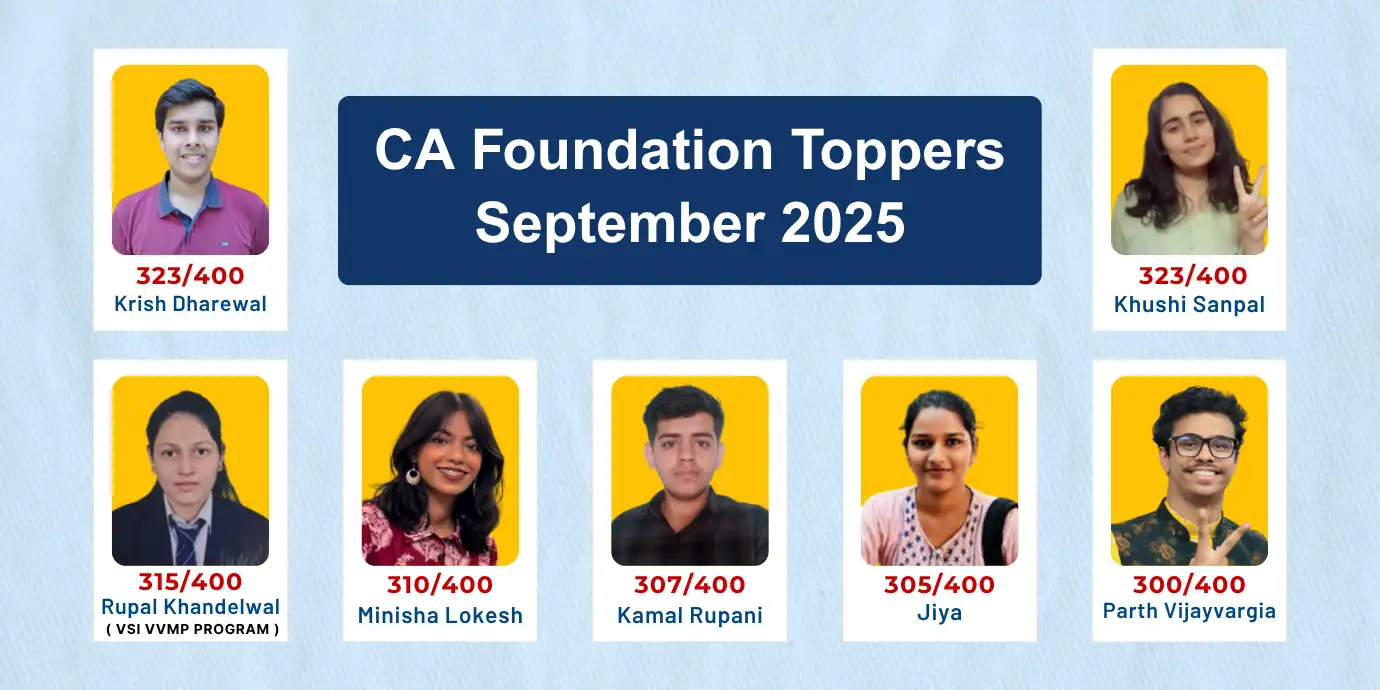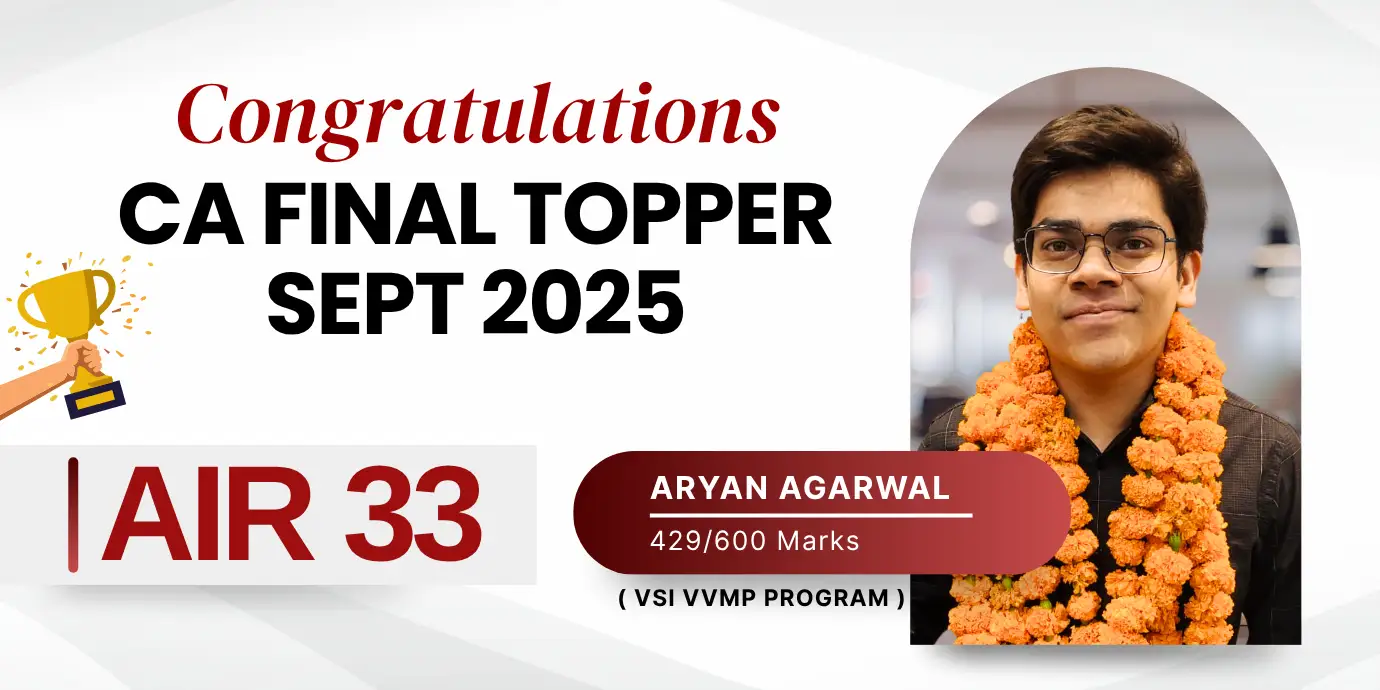Whether it is Intermediate or Final, Tax is always a scoring subject until and unless you are not proper with your studies. You can score high on this subject but there is a need for proper planning and guidance to score such.
Taxation in Intermediate is divided into two sections: one is Direct Tax, i.e. Income Tax, and another is Indirect Tax, i.e. GST and Customs, each consisting of 50 marks.
In this article, we will share some strategies through which you can score exemption in Direct Tax.
Students preparing for the 2025 exams must check the CA New scheme proposed by the ICAI.
Must Check: CA Intermediate date sheet and CA Inter admit card for September 2025 exams.
Step- 1 Selection of Study Material
Plenty of times, students cannot choose the right CA Intermediate study material. Even at the end, they often run for some other teacher’s notes, which is a big blunder.
You can purchase the ICAI study material or refer to a reference book but don’t forget to cover the Practice manual, as it is considered a Bible for the Chartered Accountancy course.
As well as stick to one material that is best suitable for you and revise it at least two to three times. Apart from the study material, students should also focus on the CA Intermediate mock test papers. Do not practice with any mock test papers that have too difficult or too easy questions.
Furthermore, you can also check the complete details of CA Intermediate Registration.
Step – 2 Cover the Five Heads of Income
Make a proper timetable and allocate your time genuinely between the five income heads and the remaining part. The five heads are Income from Salaries, Income from House Property, Income under the head PGBP, Income from Capital Gain, and Income from other Sources.
All five heads are important parts of your syllabus, but at the Intermediate level, Income from Salaries is considered the most important.
You can start with Income from House Property as it is short and easy to cover. The institute often combines the questions from House Property with other heads. You can revise the House Property in just one or two Hours.
Thereafter, pick up Income from Salaries as this is the most important chapter at the Intermediate level and a bit lengthy. Hence, covering this chapter at the start will boost your confidence, which will motivate you to complete the entire syllabus.
Capital Gain and Profit & Gain from Business and Profession require time and a detailed understanding of concepts. So, take them after House Property and Salaries. Prepare some short notes while reading these chapters, as they will help you summarise them.
Don’t skip Income from other sources as this is equally important with the other heads.
Read below how to study each chapter effectively and efficiently.
Step – 3 Cover Other Small Topics
Income Tax is not limited to these five heads as this is a vast subject. In addition to the Five Heads, it covers other topics like TDS, Advance Tax, Provisions relating to filing returns, Residential Status, and Exempt Income u/s 10.
Cover each topic and revise it thoroughly. These topics are small and easy compared to five heads.
The important thing for scoring high in Direct Tax is conceptual understanding. At the Intermediate level, you are not much expected to write the names of case studies. However, the provision and conclusion regarding the same must be correct.
Step – 4 Prepare your own handwritten notes
No doubt you are studying from the best reference boo,k but still, your own handwritten notes are the most effective material to study. You can either prepare them in Paragraph forms or chart forms, or you can draw them on charts and paste them on your room walls to revise them daily.
Check: CA Intermediate results in all information
Preparation as per Heads
Capital Gain
The most important part of the Capital Gain is Exemption starting from Section 54. The best way to remember the provision of these sections along with the section number is by preparing their tabular presentation.
Thereafter, cover the definition of Capital Gain and transfer under the Capital Gain Head. Also, write separately the points that are not considered transfers, such as Those covered in Sec 13.
Thoroughly understand LTCG, STCG, cost of acquisition, improvement, and Indexation. Then, cover Sec 50C.
Plenty of amendments to the Capital Gain were introduced in May 2018, which are very important for your upcoming Exams.
After completing the chapter don’t just put your books aside. You have to revise it regularly. Every time you read it, you will find something new.
Income from Business and Profession
Business and Profession is a lengthy but very interesting topic. It covers around 15 marks, 8 of which are compulsory questions.
Well, you have to thoroughly read the chapters, but still, most students commit some mistakes while attempting the PGBP question.
Here is a list of some important points –
- Carefully read Section 43B (Deduction on actual payment basis), as it always covers a point in your Question. Most students often make the mistake of forgetting Section 43B while attempting the question. Revise it at least three times.
- Thoroughly read depreciation under Sec 32, Sec 32 AD, and Sec 32 AC and revise the rates because the rates of Dep. for the May 2018 Exam have been amended. Hence, there is a high probability that you will find a question in your exam related to this.
- Similar to Sec 50C, there is a Sec 50CA in PGBP that deals with the sale of land by builders or property developers. Read it properly, and don’t get confused between Sec 50C and Sec 50CA.
- Before starting the question, it is very important to check the status of the assessee, i.e., whether it is a firm, company, individual, or HUF, as provisions and tax rates are different for them. Due dates are also different.
- Remember, Penalties for negligence in Law and Income Tax are not allowed as deductions. Returns of Income Tax are also not taxable, but interest on such is taxable. There is a deduction for bank interest under sec 80TTA, but interest on FDs and company deposits is fully taxable without any limit.
- TDS is required to be deducted only when the assessee was required to get his books of accounts audited in the previous year.
- If the opening stock is undervalued, it must be deducted from the net profit while calculating the income under the head of PGBP and vice versa. However, if the closing stock remains undervalued, it must be added to the Net profit while calculating the Income under PGBP and vice versa.
- Sometimes, the employer pays the tax on Non-monetary perquisites given to the employee; these are not allowed as a deduction for the Employer.
- Finance Act 2017 has revised the cash payment in a single day made to a single person, and it reduced the limit of such up to Rs 10000.
- Expenses related to Amalgamation and mergers are not allowed in a single year but are allowable in five equal instalments.
- The limit for the Tax Audit has increased from 1 Cr. to 2 Cr. under Sec 44AB.
Please read these points carefully. They cover some general mistakes that most students make while attempting their exams.
Income from House Property
Start with charging section 22 and learn how to compute income under House Property. Look at the chart below.
| Particulars | Amount |
| Gross Annual Value | XXX |
| Less – Municipal Taxes (Paid) | XXX |
| Net Annual Value | XXX |
| Less- Standard Deduction at 30% (Section 24 (a)) | XXX |
| Less – Interest on Borrowed Capital (Sec 24 (b)) | XXX |
| Income under House Property | XXX |
GAV – Higher of Expected Rent or Rent actually received.
(Loss incurred due to the vacancy shall be deducted, and the remaining amount shall be deemed to be GAV).
Municipal Taxes are allowed only when it is actually paid by the owner.
Income under the Head Salaries
First of all, understand the charging section 15 and thereafter cover –
- Tax Treatment of different types of Salaries.
- Retirement Benefits
- Allowances
- Perquisites
- Deductions under sec 16.
- Any amount received by the employee from his employer in relation to his services would be taxable as Salaries.
- The amount received by the Partners from the Firm by the way of salary will not taxable as salaries, rather it would be taxable as income from PGBP.
- It is taxable on due or receipt basis whichever is earlier.
- Salary includes all types of payment received by an employee in the form of wages, annuity or pension, gratuity, fees, commission, perquisite, or profit in lieu of salary, advance salary, leave salary etc.
This head is most important at the Intermediate level so cover it thoroughly. Revise it at least 3-4 times and practice as many questions as you can.
Income from Other Sources
This head is the smallest and can be completed within 2 – 3 hours. Sec 56 (2) (x) replaced Sec 56 (2) (vii), so read it twice. This is important for the September 2025 Exams.
Hope you will find this article helpful.








